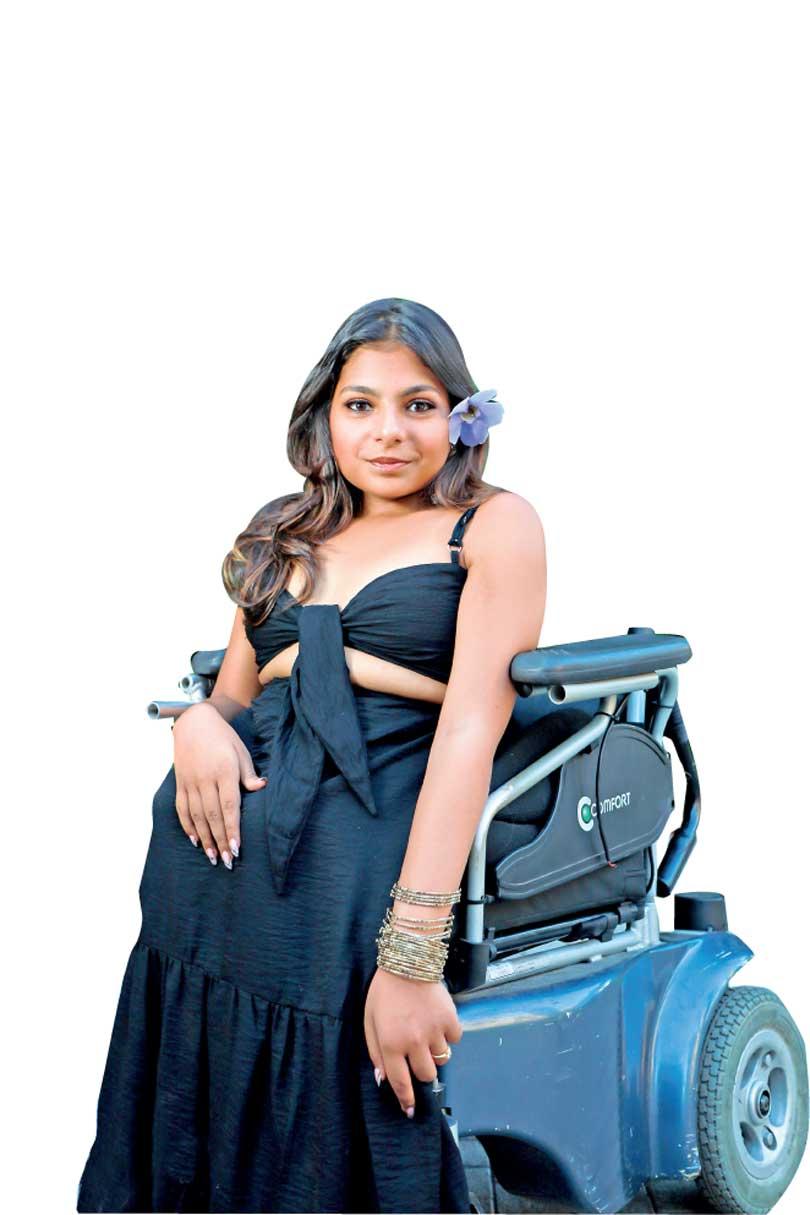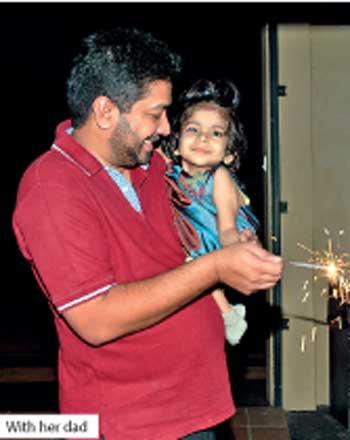13 Jun 2023 - {{hitsCtrl.values.hits}}

“When I was born, my parents didn’t know what had happened. Back in 2001, CRS wasn’t a condition that was even known well in Sri Lanka, and it’s usually caused when the mother has diabetes. But my mom, she had the perfect pregnancy, and my sisters were born without any conditions.”
“I didn’t talk to anyone for days after that surgery and when I did, I remember asking my mom why she didn’t just let me die because it would have been easier than just dealing with the pain.”
Azi Muhajireen was born with Caudal Regression Syndrome (CRS), a rare condition affecting the development of the lower part of her body. When she was born, the doctors gave her a few days to live; a few weeks at best, her parents were told. But at 21 years old, Azi is living her life to the fullest, against all odds.
When I met Azi for our interview, I knew I met someone truly remarkable. This is because we have been trying to set this interview up for weeks, but with a sudden health complication that left Azi feeling less than her best, we’ve had to postpone several times. So when we finally did set up the interview on a Tuesday evening (a little later into the night as she was meeting me after a round of medication at the hospital), I worried whether I was imposing at a time when she should be resting, but if I knew the Azi I knew at the end of our interview – I would have known my concerns were for nothing.
In a nutshell, Azi Muhajireen is a force to be reckoned with, a powerhouse I would say. Her strength and resilience were evident in every word she spoke from the moment we began to talk. Dealing with the challenges of her disability all her life, including being diagnosed with chronic kidney disease at an early age, Azi refuses to be defined by just her disability and lives life as a reminder to everyone that disability doesn’t exclude ability.
“In Sri Lanka, people’s mentality is so small at times, they think if you have a disability, you can’t do anything else; you can’t be educated, you can’t have a career, have friends or even go out” she shares. “I think having a disability is your strength. There may be one thing you can’t do, but there are so many things you can do.”
Azi herself is a graphic designer and with the start of her design business ‘Zi Design Studio’, an entrepreneur. Though she always dreamt of being an interior designer, Azi’s passion for graphic design budded during her long stays in the hospital for treatment. “I needed to keep working and doing things. I knew if I just stayed at home it was going to be so difficult and graphic design was something I could do even on my worst days”. Her keen eye for detail and flair for style and elegance soon found her a loyal clientele, those who are understanding of the unpredictability of her condition but also aware of her strong professional ethics and ability to get the job done. “Of course, I’ve had a few situations where people have doubted my ability to do this work because of my medical difficulties but I’m very honest with my clients and I tell them what I’m going through, and I never sacrifice my work and deadlines because of my condition.”
And while I see a passionate 21-year-old entrepreneur ahead of me, the road it took to get there, while almost always rocky for any entrepreneur, was a lot more challenging for Azi, especially when by all medical statistics and advice she couldn’t possibly have achieved it all in the first place.
“When I was born, my parents didn’t know what had happened. Back in 2001, CRS wasn’t a condition that was even known well in Sri Lanka, and it’s usually caused when the mother has diabetes. But my mom, she had the perfect pregnancy, and my sisters were born without any conditions. So, when I was born, they had to take me to several hospitals just to figure out what was going on and none of the doctors could diagnose me properly. They all said that I’ll only live for 7-8 days.”
At just a few months old, Azi had her first surgery, and she would continue to have 12 more in the years to come. It was in Singapore that the doctors were finally able to diagnose her with CRS and perform most of the orthopaedic surgeries necessary for her to sit up on her own. “I was born with my legs bent in towards my chest and a lot of the doctors here kept advising my parents to amputate them but in Singapore, they said it’s not necessary because I still had feeling in my legs. I’m so thankful that because of them I can sit up on my own and live as normally as I can.”
One of the major surgeries Azi had to undergo as a child however, was the Mitrofanoff Procedure, a high-risk bladder reconstruction procedure that would prevent bacteria from accumulating in the bladder.
The procedure creates a new port on the belly through which a catheter can be inserted to completely drain the bladder.
Azi follows this procedure at least four times a day, regardless of where she is, and for the past 17 years, she’s been doing it through school, university, and work. “This used to be one of my biggest secrets growing up because I was so ashamed of it and was afraid of being criticised or judged for having it, but now I believe it should be normalized because it isn’t gross, disgusting, or ugly, it’s the reason I am still alive and why I have lived the life I have and why I am beginning to embrace it.”
While these treatments have greatly improved Azi’s quality of life, CRS is medically considered a complex problem, and its treatment a ‘never-ending story’ where each patient must be assessed individually on a case-by-case basis.
 CRS can result in a variety of parallel medical complications, including chronic kidney disease, and heart, liver, and lung problems. And in 2012, at the age of 11, Azi underwent a major surgery that was life or death, unbeknown to her. “My parents were informed beforehand that I could face kidney issues in the future and if I’m stressed or don’t follow through with my monthly check-ups, it could pop out from anywhere. For a good 11 years, I’ve never really had any issues with my kidneys but a few months after my dad passed away, I was suddenly in severe pain and had to be rushed to the hospital. We did test after test and my doctor, who has been treating me since I was a child, saw the reports and told my mother to get me on the next flight to Singapore as soon as possible”. In Singapore, Azi and her mom were told that her kidney had failed and had to be removed immediately. “When they took out my kidney, it burst in the doctor’s hands. It had got so infected and had failed for months without me realizing, and had we waited for just even an hour more to do the surgery, it would have been too late.”
CRS can result in a variety of parallel medical complications, including chronic kidney disease, and heart, liver, and lung problems. And in 2012, at the age of 11, Azi underwent a major surgery that was life or death, unbeknown to her. “My parents were informed beforehand that I could face kidney issues in the future and if I’m stressed or don’t follow through with my monthly check-ups, it could pop out from anywhere. For a good 11 years, I’ve never really had any issues with my kidneys but a few months after my dad passed away, I was suddenly in severe pain and had to be rushed to the hospital. We did test after test and my doctor, who has been treating me since I was a child, saw the reports and told my mother to get me on the next flight to Singapore as soon as possible”. In Singapore, Azi and her mom were told that her kidney had failed and had to be removed immediately. “When they took out my kidney, it burst in the doctor’s hands. It had got so infected and had failed for months without me realizing, and had we waited for just even an hour more to do the surgery, it would have been too late.”
Azi looks back at that time of her life as a very dark period. Losing her father, someone she considered her best friend and a strength by her side, took a heavy toll on her emotionally and mentally. “Surgeries were mine and dad’s thing, I always went into the theatre holding his hand and I woke up from surgery holding his hand. Not having him there, really affected me. I didn’t talk to anyone for days after that surgery and when I did, I remember asking my mom why she didn’t just let me die because it would have been easier than just dealing with the pain.”
Since her surgery, Azi is functioning on one kidney which, despite being told would only function healthily for 5-6 years before requiring dialysis, had held strong for over 8 years. Unfortunately, just before the Covid-19 pandemic, a regular check-up revealed that her kidney was starting to decline, and she was advised to consider dialysis as soon as possible. “I wasn’t going to do it, you know? A long time ago, I decided I won’t go through dialysis or a kidney transplant. But not long after I was told this news, I was out with my friends, and I realized that my life is not valuable just to me but to everyone around me, and these decisions I am making don’t just impact me, but it impacts everyone I love and care about. So, I did it, I continued the medication and it worked…. for a while.” The medication she was on had caused a severe infection in her kidney causing sepsis which eventually spread into her lungs and her body. Today, her kidney is functioning at 18% and despite the continued treatments, isn’t working as well as it should.
 This is why it’s easy for me to describe Azi as a powerhouse because even as she tells me this, and I compliment her strength in the face of it all, she’s quick to correct me and share that she wasn’t always so strong, “I’ve had this since I was a child and I always expected the worst so it’s easy for me to wrap my head around it, but I don’t think I was strong about it. For the longest time, I found it very difficult to talk about and it took a while for me to tell people, even my best friends. But now, I want to be open about it and share my experiences because what if there is someone like me out there who also just wants someone to understand them better?”
This is why it’s easy for me to describe Azi as a powerhouse because even as she tells me this, and I compliment her strength in the face of it all, she’s quick to correct me and share that she wasn’t always so strong, “I’ve had this since I was a child and I always expected the worst so it’s easy for me to wrap my head around it, but I don’t think I was strong about it. For the longest time, I found it very difficult to talk about and it took a while for me to tell people, even my best friends. But now, I want to be open about it and share my experiences because what if there is someone like me out there who also just wants someone to understand them better?”
Azi’s vision is to create a platform for people going through experiences like hers while advocating for disability rights and inclusion and confronting the stereotypes that often surround the community. “I want a platform where people can connect and find a shoulder to lean on during tough times. I’ve been where they’ve been and it’s really, really difficult. No one understands your pain like you do and I wished I had someone who understood that when I was going through it. I want to build a community where people can get the support they need. There’s a lot of stigma surrounding those with disabilities and as a result, a lot of discrimination.”
Azi herself is no stranger to the stigma and discrimination, especially in some instances where her experiences with the healthcare institutions in the country had also left her bewildered – given that one would assume healthcare professionals would be the least discriminatory to the community. “I’m on long term pain management right now, and while I’m very understanding that these medications are addictive and a controlled drug, the attitudes and behaviours of some of the healthcare professionals in the field are shocking. I’ve personally had a doctor who refused to give me an injection for pain relief because he believed I wasn’t in much pain and that I was abusing drugs based on the marks on my hand, despite the nurses vouching that they were from the cannulas I’ve been getting for the past few weeks! Does a person have to be crying and screaming in pain to get the treatment they need?”
She also adds that the lack of disability friendly spaces in Sri Lanka and worse, the less empathetic attitude of some people can leave very bitter experiences that could have been avoided. “People think that if you have a disability, you can’t have a social life. I’ve been to places where they’ve told me that I’m welcome into their establishment, but my wheelchair isn’t – like it’s some accessory for me to remove and keep. Everyone deserves a chance to go wherever they want, disabled or not.”
 Azi’s experiences are a stark reminder of the challenges faced by those with disabilities in Sri Lanka and it’s conversations like these that sheds attention to issues that shouldn’t be just ‘their’ fight alone to ensure that people like her have the same access and opportunities as anyone else. “If you don’t understand or you don’t know how you can help, just ask,” she advices, “It’s okay to be inquisitive. I can’t be seated here saying don’t judge me if I’m not willing to share my experiences and be open to talking about it.”
Azi’s experiences are a stark reminder of the challenges faced by those with disabilities in Sri Lanka and it’s conversations like these that sheds attention to issues that shouldn’t be just ‘their’ fight alone to ensure that people like her have the same access and opportunities as anyone else. “If you don’t understand or you don’t know how you can help, just ask,” she advices, “It’s okay to be inquisitive. I can’t be seated here saying don’t judge me if I’m not willing to share my experiences and be open to talking about it.”
Keen to end our conversation on a good note, I ask Azi a question I love asking many of my interviewees – what is your happiest memory? She considers it for a few minutes before answering me with a laugh, “this is a bit ironic, but as tough as my medical journey has been, some of my best memories lie there. My dad who was always there for me, every step of the way. My mom in how well she looks after me and how she would do just about anything to put a smile on my face….my best memories are not big things, it’s the small, tiny things that always come back to me as a reminder of the best times during what was also the worst times.”
17 Jun 2024 47 minute ago
17 Jun 2024 54 minute ago
17 Jun 2024 1 hours ago
17 Jun 2024 2 hours ago
17 Jun 2024 4 hours ago